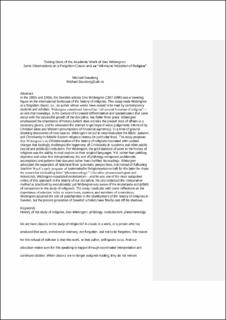| dc.description.abstract | In the 1950s and 1960s, the Swedish scholar Geo Widengren (1907–1996) was a towering figure on the international landscape of the history of religions. This essay reads Widengren as a forgotten classic, i.e., an author whose works have ceased to be read by contemporary students and scholars. Widengren considered himself an “all-around historian of religion” – an aim that nowadays, in the context of increased differentiation and specialization that came about with the successful growth of the discipline, has fallen from grace. Widengren emphasized the importance of history (which does not take the present state of affairs as a necessary given), and he advocated the attempt to get beyond value-judgements informed by Christian ideas and Western presumptions of historical supremacy. In a time of ground-breaking discoveries of new sources, Widengren set out to recontextualize the Bible, Judaism, and Christianity in Middle Eastern religious history (in particular Iran). The essay proposes that Widengren’s de-Christianization of the history of religions resonated with societal changes that lastingly challenged the hegemony of Christianity in academia and other public (social and political) institutions. For Widengren, the gold standard of work in the history of religions was the ability to read sources in their original languages. Yet, rather than yielding objective and value-free interpretations, his sort of philology reimposed problematic assumptions and patterns that obscured rather than clarified his readings. Widengren advocated the separation of historical from systematic perspectives, but instead of following Joachim Wach’s early program of systematische Religionswissenschaft for the latter he chose the somewhat misleading label “phenomenology.” Like other phenomenologists and historicists, Widengren repudiated evolutionism – and he was one of the most outspoken critics of this approach in the history of our discipline. He also criticized the comparative method as practiced by evolutionists; yet Widengren was aware of the importance and pitfalls of comparison in the study of religion/s. The essay concludes with some reflections on the importance of scholars’ roles as supervisors, mentors, and members of committees; Widengren assumed the role of paterfamilias in the development of the history of religions in Sweden, but the present generation of Swedish scholars have finally cast off his shadows. | en_US |
